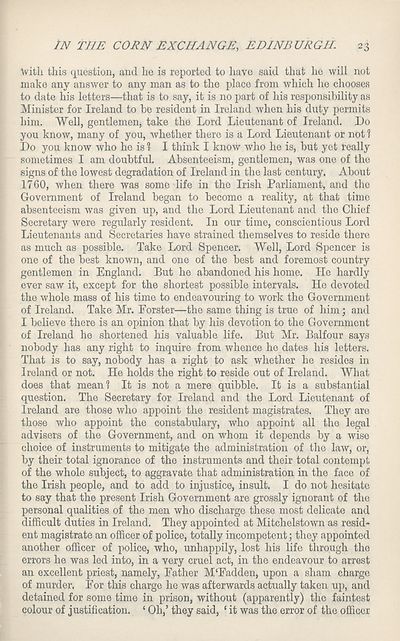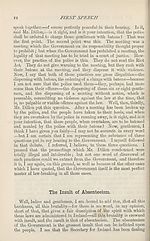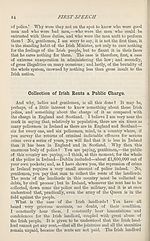Download files
Complete book:
Individual page:
Thumbnail gallery: Grid view | List view

In the corn exchange, Edinburgh. 23
Villi this question, and he is reported to have said that he will not
make any answer to any man as to the place from which he chooses
to date his letters—that is to say, it is no part of his responsibility as
Minister for Ireland to be resident in Ireland when his duty permits
him. Well, gentlemenj take the Lord Lieutenant of Ireland. Do
you know, many of you, whether there is a Lord Lieutenant or not 1
Do you know who he is? I think I know who he is, but yet really
sometimes I am doubtful. Absenteeism, gentlemen, was one of the
signs of the lowest degradation of Ireland in the last century. About
1760, when there was some life in the Irish Parliament, and the
Government of Ireland began to become a reality, at that time
absenteeism was given up, and the Lord Lieutenant and the Chief
Secretary were regularly resident. In our time, conscientious Lord
Lieutenants and Secretaries have strained themselves to reside there
as much as possible. Take Lord Spencer. Well, Lord Spencer is
one of the best known, and one of the best and foremost country
gentlemen in England. But he abandoned his home. He hardly
ever saw it, except for the shortest possible intervals. He devoted
the whole mass of his time to endeavouring to work the Government
of Ireland. Take Mr. Eorster—the same thing is true of him; and
I believe there is an opinion that by his devotion to the Government
of Ireland he shortened his valuable life. But Mr. Balfour says
nobody has any right to inquire from whence he dates his letters.
That is to say, nobody has a right to ask whether he resides in
Ireland or not. He holds the right to reside out of Ireland. What
does that mean? It is not a mere quibble. It is a substantial
question. The Secretary for Ireland and the Lord Lieutenant of
Ireland are those who appoint the resident magistrates. They are
those who appoint the constabulary, who appoint all the legal
advisers of the Government, and on whom it depends by a wise
choice of instruments to mitigate the administration of the law, or,
by their total ignorance of the instruments and their total contempt
of the whole subject, to aggravate that administration in the face of
the Irish people, and to add to injustice, insult. I do not hesitate
to say that the present Irish Government are grossly ignorant of the
personal qualities of the men who discharge these most delicate and
difficult duties in Ireland. They appointed at Mitchelstown as resid¬
ent magistrate an officer of police, totally incompetent; they appointed
another officer of police, who, unhappily, lost his life through the
errors he was led into, in a very cruel act, in the endeavour to arrest
an excellent priest, namely, Father M‘Eadden, upon a sham charge
of murder. For this charge he was afterwards actually taken up, and
detained for some time in prison, without (apparently) the faintest
colour of justification. ‘ Oh,’ they said, ‘ it was the error of the officer
Villi this question, and he is reported to have said that he will not
make any answer to any man as to the place from which he chooses
to date his letters—that is to say, it is no part of his responsibility as
Minister for Ireland to be resident in Ireland when his duty permits
him. Well, gentlemenj take the Lord Lieutenant of Ireland. Do
you know, many of you, whether there is a Lord Lieutenant or not 1
Do you know who he is? I think I know who he is, but yet really
sometimes I am doubtful. Absenteeism, gentlemen, was one of the
signs of the lowest degradation of Ireland in the last century. About
1760, when there was some life in the Irish Parliament, and the
Government of Ireland began to become a reality, at that time
absenteeism was given up, and the Lord Lieutenant and the Chief
Secretary were regularly resident. In our time, conscientious Lord
Lieutenants and Secretaries have strained themselves to reside there
as much as possible. Take Lord Spencer. Well, Lord Spencer is
one of the best known, and one of the best and foremost country
gentlemen in England. But he abandoned his home. He hardly
ever saw it, except for the shortest possible intervals. He devoted
the whole mass of his time to endeavouring to work the Government
of Ireland. Take Mr. Eorster—the same thing is true of him; and
I believe there is an opinion that by his devotion to the Government
of Ireland he shortened his valuable life. But Mr. Balfour says
nobody has any right to inquire from whence he dates his letters.
That is to say, nobody has a right to ask whether he resides in
Ireland or not. He holds the right to reside out of Ireland. What
does that mean? It is not a mere quibble. It is a substantial
question. The Secretary for Ireland and the Lord Lieutenant of
Ireland are those who appoint the resident magistrates. They are
those who appoint the constabulary, who appoint all the legal
advisers of the Government, and on whom it depends by a wise
choice of instruments to mitigate the administration of the law, or,
by their total ignorance of the instruments and their total contempt
of the whole subject, to aggravate that administration in the face of
the Irish people, and to add to injustice, insult. I do not hesitate
to say that the present Irish Government are grossly ignorant of the
personal qualities of the men who discharge these most delicate and
difficult duties in Ireland. They appointed at Mitchelstown as resid¬
ent magistrate an officer of police, totally incompetent; they appointed
another officer of police, who, unhappily, lost his life through the
errors he was led into, in a very cruel act, in the endeavour to arrest
an excellent priest, namely, Father M‘Eadden, upon a sham charge
of murder. For this charge he was afterwards actually taken up, and
detained for some time in prison, without (apparently) the faintest
colour of justification. ‘ Oh,’ they said, ‘ it was the error of the officer
Set display mode to:
![]() Universal Viewer |
Universal Viewer | ![]() Mirador |
Large image | Transcription
Mirador |
Large image | Transcription
| Antiquarian books of Scotland > Politics & government > Political speeches in Scotland in 1890 > (27) |
|---|
| Permanent URL | https://digital.nls.uk/126568614 |
|---|
| Description | Thousands of printed books from the Antiquarian Books of Scotland collection which dates from 1641 to the 1980s. The collection consists of 14,800 books which were published in Scotland or have a Scottish connection, e.g. through the author, printer or owner. Subjects covered include sport, education, diseases, adventure, occupations, Jacobites, politics and religion. Among the 29 languages represented are English, Gaelic, Italian, French, Russian and Swedish. |
|---|

